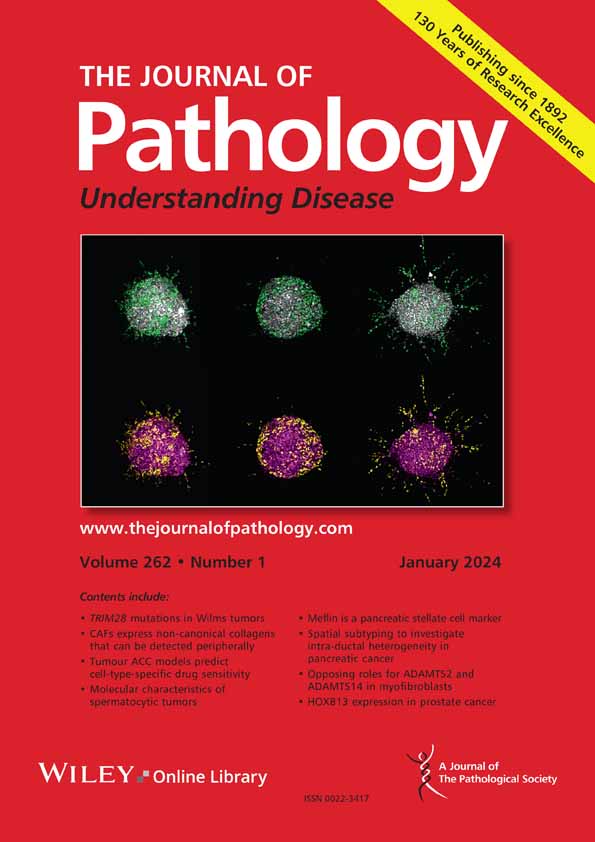KAT8/SIRT7-mediated Fascin-K41 acetylation/deacetylation regulates tumor metastasis in esophageal squamous cell carcinoma
Da-Jia Li, Yin-Wei Cheng, Jin-Mei Pan, Zhen-Chang Guo, Shao-Hong Wang, Qing-Feng Huang, Ping-Juan Nie, Wen-Qi Shi, Xiu-E Xu, Bing Wen, Jin-Ling Zhong, Zhi-Da Zhang, Zhi-Yong Wu, Hui Zhao, Lian-Di Liao, Jian-Yi Wu, Kai Zhang, Geng Dong, En-Min Li, Li-Yan Xu
求助PDF
{"title":"KAT8/SIRT7-mediated Fascin-K41 acetylation/deacetylation regulates tumor metastasis in esophageal squamous cell carcinoma","authors":"Da-Jia Li, Yin-Wei Cheng, Jin-Mei Pan, Zhen-Chang Guo, Shao-Hong Wang, Qing-Feng Huang, Ping-Juan Nie, Wen-Qi Shi, Xiu-E Xu, Bing Wen, Jin-Ling Zhong, Zhi-Da Zhang, Zhi-Yong Wu, Hui Zhao, Lian-Di Liao, Jian-Yi Wu, Kai Zhang, Geng Dong, En-Min Li, Li-Yan Xu","doi":"10.1002/path.6261","DOIUrl":null,"url":null,"abstract":"<p>Fascin actin-bundling protein 1 (Fascin) is highly expressed in a variety of cancers, including esophageal squamous cell carcinoma (ESCC), working as an important oncogenic protein and promoting the migration and invasion of cancer cells by bundling F-actin to facilitate the formation of filopodia and invadopodia. However, it is not clear how exactly the function of Fascin is regulated by acetylation in cancer cells. Here, in ESCC cells, the histone acetyltransferase KAT8 catalyzed Fascin lysine 41 (K41) acetylation, to inhibit Fascin-mediated F-actin bundling and the formation of filopodia and invadopodia. Furthermore, NAD-dependent protein deacetylase sirtuin (SIRT) 7-mediated deacetylation of Fascin-K41 enhances the formation of filopodia and invadopodia, which promotes the migration and invasion of ESCC cells. Clinically, the analysis of cancer and adjacent tissue samples from patients with ESCC showed that Fascin-K41 acetylation was lower in the cancer tissue of patients with lymph node metastasis than in that of patients without lymph node metastasis, and low levels of Fascin-K41 acetylation were associated with a poorer prognosis in patients with ESCC. Importantly, K41 acetylation significantly blocked NP-G2-044, one of the Fascin inhibitors currently being clinically evaluated, suggesting that NP-G2-044 may be more suitable for patients with low levels of Fascin-K41 acetylation, but not suitable for patients with high levels of Fascin-K41 acetylation. © 2024 The Pathological Society of Great Britain and Ireland. Published by John Wiley & Sons, Ltd.</p>","PeriodicalId":232,"journal":{"name":"The Journal of Pathology","volume":"263 1","pages":"74-88"},"PeriodicalIF":5.2000,"publicationDate":"2024-02-27","publicationTypes":"Journal Article","fieldsOfStudy":null,"isOpenAccess":false,"openAccessPdf":"","citationCount":"0","resultStr":null,"platform":"Semanticscholar","paperid":null,"PeriodicalName":"The Journal of Pathology","FirstCategoryId":"3","ListUrlMain":"https://pathsocjournals.onlinelibrary.wiley.com/doi/10.1002/path.6261","RegionNum":2,"RegionCategory":"医学","ArticlePicture":[],"TitleCN":null,"AbstractTextCN":null,"PMCID":null,"EPubDate":"","PubModel":"","JCR":"Q1","JCRName":"ONCOLOGY","Score":null,"Total":0}
引用次数: 0
引用
批量引用
Abstract
Fascin actin-bundling protein 1 (Fascin) is highly expressed in a variety of cancers, including esophageal squamous cell carcinoma (ESCC), working as an important oncogenic protein and promoting the migration and invasion of cancer cells by bundling F-actin to facilitate the formation of filopodia and invadopodia. However, it is not clear how exactly the function of Fascin is regulated by acetylation in cancer cells. Here, in ESCC cells, the histone acetyltransferase KAT8 catalyzed Fascin lysine 41 (K41) acetylation, to inhibit Fascin-mediated F-actin bundling and the formation of filopodia and invadopodia. Furthermore, NAD-dependent protein deacetylase sirtuin (SIRT) 7-mediated deacetylation of Fascin-K41 enhances the formation of filopodia and invadopodia, which promotes the migration and invasion of ESCC cells. Clinically, the analysis of cancer and adjacent tissue samples from patients with ESCC showed that Fascin-K41 acetylation was lower in the cancer tissue of patients with lymph node metastasis than in that of patients without lymph node metastasis, and low levels of Fascin-K41 acetylation were associated with a poorer prognosis in patients with ESCC. Importantly, K41 acetylation significantly blocked NP-G2-044, one of the Fascin inhibitors currently being clinically evaluated, suggesting that NP-G2-044 may be more suitable for patients with low levels of Fascin-K41 acetylation, but not suitable for patients with high levels of Fascin-K41 acetylation. © 2024 The Pathological Society of Great Britain and Ireland. Published by John Wiley & Sons, Ltd.
KAT8/SIRT7介导的Fascin-K41乙酰化/去乙酰化调节食管鳞状细胞癌的肿瘤转移。
Fascin 肌动蛋白捆绑蛋白1(Fascin)在包括食管鳞状细胞癌(ESCC)在内的多种癌症中高度表达,它是一种重要的致癌蛋白,通过捆绑F-肌动蛋白促进丝状嵴和侵袭嵴的形成,从而促进癌细胞的迁移和侵袭。然而,目前还不清楚 Fascin 的功能在癌细胞中究竟是如何受乙酰化调控的。在这里,组蛋白乙酰转移酶KAT8催化了ESCC细胞中Fascin赖氨酸41(K41)的乙酰化,从而抑制了Fascin介导的F-肌动蛋白捆绑以及丝状嵴和内陷嵴的形成。此外,NAD依赖性蛋白去乙酰化酶sirtuin(SIRT)7介导的Fascin-K41去乙酰化增强了丝状体和侵袭体的形成,从而促进了ESCC细胞的迁移和侵袭。临床上,对 ESCC 患者的癌组织和邻近组织样本的分析表明,淋巴结转移患者的癌组织中 Fascin-K41 乙酰化水平低于无淋巴结转移的患者,而低水平的 Fascin-K41 乙酰化与 ESCC 患者较差的预后有关。重要的是,K41乙酰化对目前正在临床评估的Fascin抑制剂之一NP-G2-044有明显的阻断作用,这表明NP-G2-044可能更适合Fascin-K41乙酰化水平低的患者,但不适合Fascin-K41乙酰化水平高的患者。© 2024 大不列颠及爱尔兰病理学会。John Wiley & Sons, Ltd.出版。
本文章由计算机程序翻译,如有差异,请以英文原文为准。


